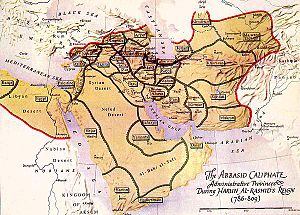786
Appearance
| Millennium: | 1st millennium |
|---|---|
| Centuries: | |
| Decades: | |
| Years: |
| 786 by topic |
|---|
| Leaders |
| Categories |
| Gregorian calendar | 786 DCCLXXXVI |
| Ab urbe condita | 1539 |
| Armenian calendar | 235 ԹՎ ՄԼԵ |
| Assyrian calendar | 5536 |
| Balinese saka calendar | 707–708 |
| Bengali calendar | 192–193 |
| Berber calendar | 1736 |
| Buddhist calendar | 1330 |
| Burmese calendar | 148 |
| Byzantine calendar | 6294–6295 |
| Chinese calendar | 乙丑年 (Wood Ox) 3483 or 3276 — to — 丙寅年 (Fire Tiger) 3484 or 3277 |
| Coptic calendar | 502–503 |
| Discordian calendar | 1952 |
| Ethiopian calendar | 778–779 |
| Hebrew calendar | 4546–4547 |
| Hindu calendars | |
| - Vikram Samvat | 842–843 |
| - Shaka Samvat | 707–708 |
| - Kali Yuga | 3886–3887 |
| Holocene calendar | 10786 |
| Iranian calendar | 164–165 |
| Islamic calendar | 169–170 |
| Japanese calendar | Enryaku 5 (延暦5年) |
| Javanese calendar | 681–682 |
| Julian calendar | 786 DCCLXXXVI |
| Korean calendar | 3119 |
| Minguo calendar | 1126 before ROC 民前1126年 |
| Nanakshahi calendar | −682 |
| Seleucid era | 1097/1098 AG |
| Thai solar calendar | 1328–1329 |
| Tibetan calendar | 阴木牛年 (female Wood-Ox) 912 or 531 or −241 — to — 阳火虎年 (male Fire-Tiger) 913 or 532 or −240 |

Year 786 (DCCLXXXVI) was a common year starting on Sunday of the Julian calendar, the 786th year of the Common Era (CE) and Anno Domini (AD) designations, the 786th year of the 1st millennium, the 86th year of the 8th century, and the 7th year of the 780s decade. The denomination 786 for this year has been used since the early medieval period, when the Anno Domini calendar era became the prevalent method in Europe for naming years.
Events
[edit]By place
[edit]Europe
[edit]- King Charles the Younger, son of Charlemagne and ruler of Aquitaine, visits Monte Cassino and Capua, both in Beneventan territory. Prince Arechis II, feeling threatened by the Franks, decides that he needs to stop quarrelling with the Byzantine Duchy of Naples so he can focus on the Frankish foe. Prince Arechis II therefore signs a peace agreement, or 'pactum', with the Duchy of Naples.
Britain
[edit]- Cyneheard, brother of the late king Sigeberht, ambushes and kills his rival Cynewulf of Wessex, while he is at Meretun (now called Marten) with his mistress. The Wessex nobles refuse to recognise Cyneheard as king.
- Cyneheard is executed and succeeded by Beorhtric, through the support of King Offa of Mercia. His rival claimant to the Wessex throne, a distant nephew of the late king Ine, named Egbert, is driven across the Channel.
- Egbert settles at the court of Charlemagne, and learns the arts of government during his time in Gaul.[1] During his stay he meets Eadberht, a priest, who later becomes king of Kent.
Abbasid Caliphate
[edit]- June 11 – Battle of Fakhkh: An Alid uprising in Medina is crushed by the Abbasids. One of the Alids, Idris ibn Abdallah, flees to the Maghreb in western North Africa, where he later founds the Idrisid dynasty[2] in 788/789.
- September 14 – Harun al-Rashid becomes the Abbasid caliph in Baghdad, upon the death of his brother Al-Hadi. He appoints Salim Yunisi as governor of Sindh and the Indus Valley.
By topic
[edit]Religion
[edit]- Beatus of Liébana, monk and theologian, publishes his Commentary on the Apocalypse.
Births
[edit]- October 10 – Saga, emperor of Japan (d. 842)
- Adelochus, archbishop of Strasbourg (d. 823)
- Al-Ḥajjāj ibn Yūsuf ibn Maṭar, Muslim mathematician (d. 833)
- Al-Ma'mun, Muslim caliph (d. 833)
- Sahl ibn Bishr, Muslim astrologer (approximate date)
- Tachibana no Kachiko, empress of Japan (d. 850)
Deaths
[edit]- June 11 – Al-Husayn ibn Ali al-Abid, anti-Abbasid rebel leader[2]
- September 14 – Al-Hadi, Muslim caliph (b. 764)
- September – Marajil, mother of caliph al-Ma'mun.
- October 16 – Lullus, archbishop of Mainz
- Abo of Tiflis, Christian martyr
- Al-Rabi' ibn Yunus, Muslim minister (or 785)
- Cyneheard the Ætheling, nobleman of Wessex
- Cynewulf, king of Wessex
- Desiderius, king of the Lombards (approximate date)
- Diarmait mac Conaing, king of South Brega (Ireland)
- Sakanoue no Karitamaro, Japanese general (b. 727)
- Tipraiti mac Taidg, king of Connacht (Ireland)
- Empress Wang (Dezong) of China
References
[edit]- ^ Kirby, Earliest English Kings, pp. 176-177.
- ^ a b Veccia Vaglieri, L. (1971). "al-Ḥusayn b. ʿAlī, Ṣāḥib Fak̲h̲k̲h̲". In Lewis, B.; Ménage, V. L.; Pellat, Ch. & Schacht, J. (eds.). The Encyclopaedia of Islam, Second Edition. Volume III: H–Iram. Leiden: E. J. Brill. pp. 615–617. doi:10.1163/1573-3912_islam_SIM_2979. OCLC 495469525.
